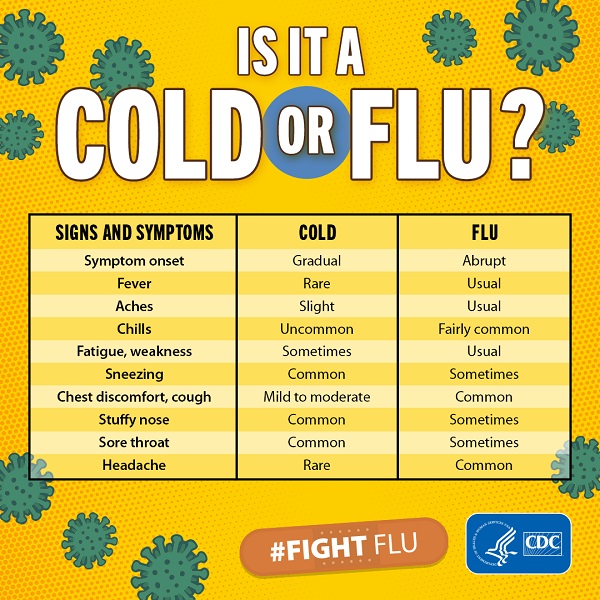What Is The Difference Between A Cold And Influenza (Flu)? Here's What You Should Know
They're both contagious but one can lead to more serious complications than the other.
When you're feeling under the weather — sore throat, pounding headache, and a stuffy nose or more — you may wonder if you have symptoms of a cold or influenza (flu), after eliminating COVID-19 from the picture, of course
First things first though, you should know that they're not the same thing. Influenza (flu) and the common cold are contagious respiratory infections, but are caused by different viruses.
While traits for both are similar, and can be difficult to distinguish without proper tests, a cold typically presents symptoms that are milder compared to influenza (flu). Symptoms for the common cold also usually come on gradually, in addition to having a shorter recovery time frame.
If you have influenza (flu), you may experience more intense symptoms that can begin suddenly.
It can also cause more serious complications than the common cold — especially for older folks above the age of 65.
Most people who get sick with influenza (flu) go on to make a full recovery when coupled with plenty of rest and fluids. However, some people may develop complications that can be life-threatening, and in serious cases, lead to death.
According to the Centers for Disease Control and Prevention (CDC), these range from sinus and ear infections, which are moderate examples, to more serious complications like pneumonia and inflammation of the heart (myocarditis).
For older people, especially those who are above 65, immunocompromised, or have pre-existing health issues, the consequences can be life-threatening, as influenza (flu) may potentially trigger heart attacks or strokes.
It's worth noting that anyone can get sick with influenza (flu). However, certain high-risk groups, including children and the elderly, are more prone to developing serious complications.
You can catch influenza (flu) the same way you do with a cold — when you come in contact with droplets from someone who is sick — which is why it is important to practice good personal hygiene, and avoid going out when you're feeling unwell (or wear a mask when you do leave the house), among other precautions.
With the festive season approaching, large gatherings during a time like Chinese New Year can increase the risk of infection, and may impact the elderly the hardest, among other demographics.
Those in the high-risk group include:
- Pregnant women
- Children below five years old
- Adults aged 65 years and above
- Individuals with chronic medical conditions
- Healthcare workers
So, how do you prevent yourself and your loved ones from getting influenza (flu)? Getting a yearly influenza vaccine is considered your best shot.
Besides basic precautions like keeping your hands clean with soap and water or hand sanitiser, getting vaccinated is one of the best ways to keep influenza (flu) viruses, which cause you to fall sick, from attacking your immune system.
And, since it's harder for older people to fight off influenza (flu), it is especially important for people above 65 to get their yearly vaccine shot. For people with chronic non-communicable diseases (NCDs), the risk of their condition worsening is even higher.
Watch this video on influenza (flu) prevention for the elderly below:
With the festive season expected to hit full swing soon, consider safeguarding your loved ones and their health by getting vaccinated
Called 'Preventing the Flu at 65 & Beyond, I Get It Done', the latest theme of Flu Prevention is an Act of Love Campaign, it emphasises enfluenza prevention as part of a holistic approach to ageing healthily. It focuses on those aged 65 and above, considering this age group is more likely to experience severe illness and/or complications as a result of influenza (flu).
If get-togethers and dinner parties are part of your plans this holiday season, and you or other elderly family members aren't vaccinated against influenza (flu) yet, it is a good idea to make an appointment with your doctor to find out your best options soon.
For more information about influenza (flu) prevention, visit Flu Prevention is an Act of Love's website.





